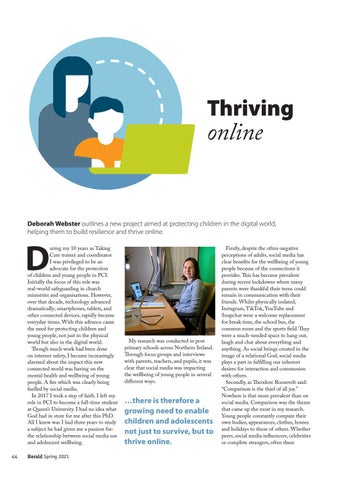Thriving
online
Deborah Webster outlines a new project aimed at protecting children in the digital world, helping them to build resilience and thrive online.
D
uring my 10 years as Taking Care trainer and coordinator I was privileged to be an advocate for the protection of children and young people in PCI. Initially the focus of this role was real-world safeguarding in church ministries and organisations. However, over that decade, technology advanced dramatically; smartphones, tablets, and other connected devices, rapidly became everyday items. With this advance came the need for protecting children and young people, not just in the physical world but also in the digital world. Though much work had been done on internet safety, I became increasingly alarmed about the impact this new connected world was having on the mental health and wellbeing of young people. A fire which was clearly being fuelled by social media. In 2017 I took a step of faith. I left my role in PCI to become a full-time student at Queen’s University. I had no idea what God had in store for me after this PhD. All I knew was I had three years to study a subject he had given me a passion for: the relationship between social media use and adolescent wellbeing.
44
Herald Spring 2021
My research was conducted in post primary schools across Northern Ireland. Through focus groups and interviews with parents, teachers, and pupils, it was clear that social media was impacting the wellbeing of young people in several different ways.
…there is therefore a growing need to enable children and adolescents not just to survive, but to thrive online.
Firstly, despite the often-negative perceptions of adults, social media has clear benefits for the wellbeing of young people because of the connections it provides. This has become prevalent during recent lockdowns where many parents were thankful their teens could remain in communication with their friends. Whilst physically isolated, Instagram, TikTok, YouTube and Snapchat were a welcome replacement for break time, the school bus, the common room and the sports field. They were a much-needed space to hang out, laugh and chat about everything and anything. As social beings created in the image of a relational God, social media plays a part in fulfilling our inherent desires for interaction and communion with others. Secondly, as Theodore Roosevelt said: “Comparison is the thief of all joy.” Nowhere is that more prevalent than on social media. Comparison was the theme that came up the most in my research. Young people constantly compare their own bodies, appearances, clothes, homes and holidays to those of others. Whether peers, social media influencers, celebrities or complete strangers, often these


















